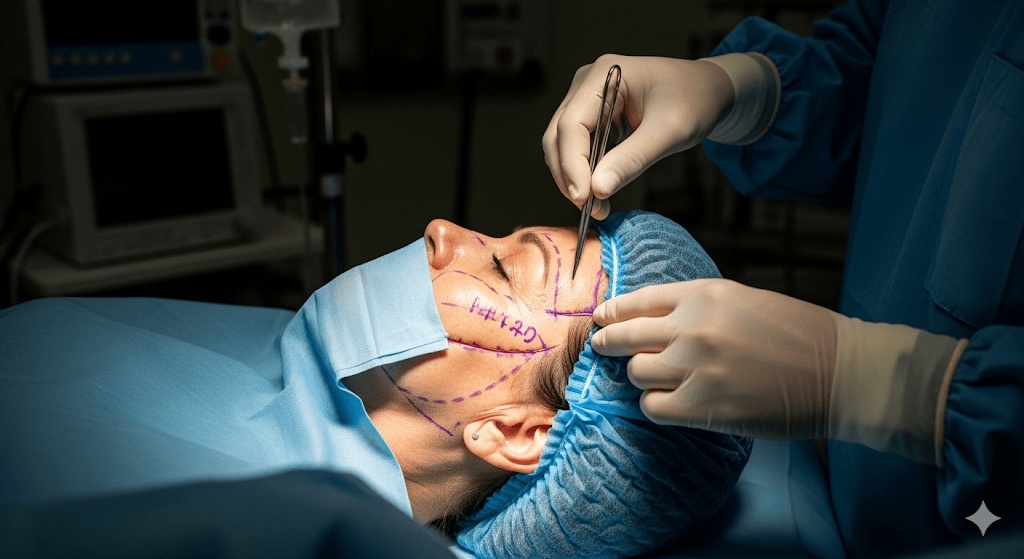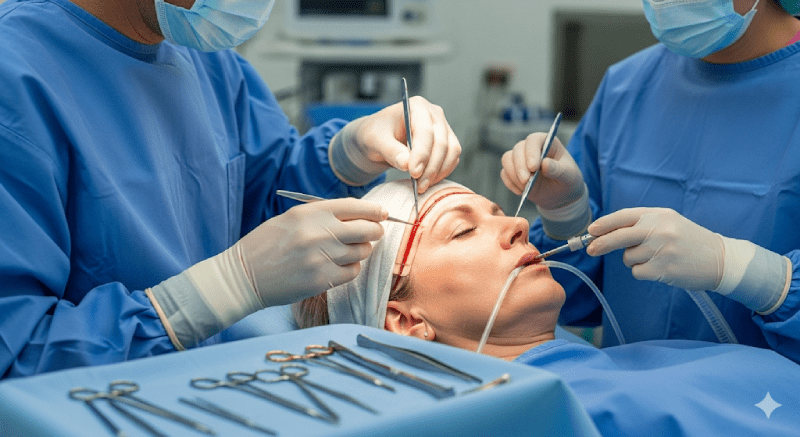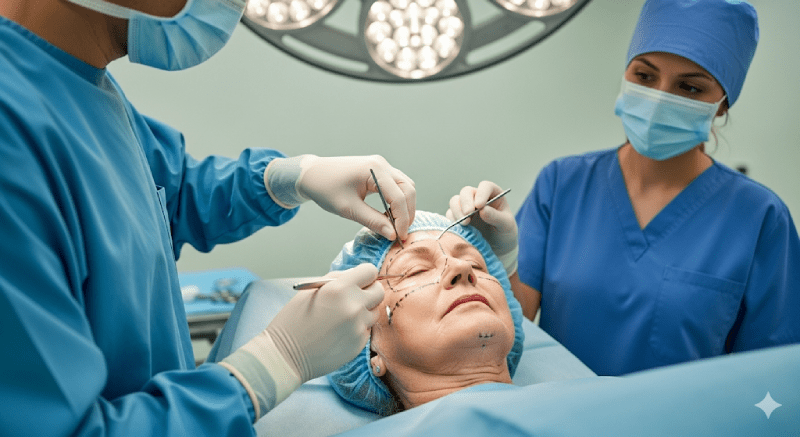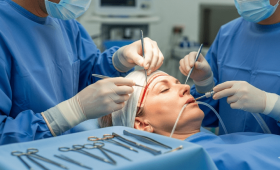What Is Mini Facelift Surgery?
Mini facelift surgery is a less invasive aesthetic surgical procedure that focuses on correcting the signs of aging in the mid and lower parts of the face. This surgery is ideal for individuals with mild sagging who do not require a full facelift.
During the operation, sagging skin and tissues in the jawline and cheeks are pulled upwards and tightened through small incisions. As a result, a more vibrant, youthful, and natural facial expression is achieved, while the recovery process is much shorter than with a traditional facelift. This method is especially preferred by patients who want to preserve the subtle contours of their face.
Who Is a Suitable Candidate for a Mini Facelift?
The most suitable candidates for a mini facelift are typically individuals between the ages of 40 and 50 who show mild to moderate signs of sagging in the lower part of their face. This operation offers effective results, especially for individuals with laxity in the jawline and neck area but without deep wrinkles.
It is very important that those considering the surgery are in good general health, do not smoke or quit before the surgery, and have realistic expectations from the operation. The surgeon will evaluate the person’s skin elasticity and facial structure to determine the most suitable treatment plan.
What Are the Prices for a Mini Facelift in Turkey?
Mini facelift surgery prices in Turkey are quite economical compared to Western countries. Prices vary depending on the surgeon’s experience, the location of the clinic or hospital, the technology used, and the scope of the operation.
Prices are generally offered in packages that include the surgery, anesthesia, hospital stay, medications, and post-operative care. These packages make all costs transparent for foreign patients, ensuring they do not face any unexpected surprises. Turkey’s competitive pricing policy in health tourism combines high quality with an affordable cost.
What Is the Difference Between a Mini Facelift and a Traditional Facelift?
The most fundamental difference between a mini facelift and a traditional facelift is the scope and duration of the operation. A mini facelift focuses only on the lower third of the face and is performed with smaller incisions. Therefore, the recovery process is faster and less invasive. A traditional facelift, on the other hand, covers the entire face (forehead, cheeks, chin, and neck) and is a more comprehensive operation. While the traditional method is preferred for patients with more advanced signs of aging and who expect more pronounced results, a mini facelift offers a solution for more mild sagging.
How Long Does the Surgery Take?
Mini facelift surgery takes less time than a traditional facelift. The operation is usually performed under general anesthesia or local anesthesia and is completed in an average of 1 to 3 hours. This duration may vary depending on the surgeon’s experience and the details of the surgery. The shorter duration of the surgery means patients are exposed to anesthesia for a shorter time, which positively affects the post-operative recovery process. After the operation, patients are usually discharged from the hospital on the same day or a day later.
What Is the Post-operative Recovery Process Like?
The recovery process after a mini facelift is fast and comfortable. Mild swelling, bruising, and a feeling of tightness may be observed during the first few days after the surgery. These symptoms generally begin to subside within a week. Most patients can return to work a week after the surgery. Full recovery and the final results becoming apparent may take a few months. To speed up the recovery process, it is important to take the medications prescribed by the doctor regularly and avoid physical activities.

How Permanent Are the Results of a Mini Facelift?
The results of mini facelift surgery are long-lasting, but they are not permanent because the natural aging process continues. The surgery turns back time, giving your face a more youthful appearance. The results usually last for 5 to 10 years. To ensure the results last longer, it is recommended to pay attention to lifestyle habits such as regular skincare, a healthy diet, and sun protection.
What Are the Possible Risks and Complications of the Surgery?
As with any surgical procedure, mini facelift surgery has some risks. Possible complications can include infection, bleeding, asymmetry, nerve damage, and reactions to anesthesia. These risks are minimized when the surgery is performed by an experienced surgeon in a sterile environment. It is important to have a detailed discussion with your surgeon about the possible risks before the surgery.
Why Is a Mini Facelift More Affordable in Turkey?
The main reasons why mini facelift surgeries are more affordable in Turkey include low labor and operating costs. Clinic rents, staff salaries, and general expenses are much lower compared to Western countries. Additionally, government support for health tourism and the value of the Turkish Lira against other currencies allow for attractive prices to be offered to foreign patients. This ensures that competitive prices are offered without compromising on quality.
What Should Be Done Before the Surgery?
It is vital to follow all the instructions given by your surgeon before the surgery. The use of blood-thinning medications and herbal supplements should be stopped at least two weeks beforehand. Smoking and alcohol consumption should be stopped at least one month in advance because these substances negatively affect the healing process. It is recommended not to wear makeup and to wear comfortable clothes on the day of the surgery. All these precautions help ensure the surgery is successful and safe.
What Should Be Considered After the Surgery?
After the surgery, it is important to sleep with your head elevated for the first few days to reduce swelling. You should use the medications recommended by your surgeon regularly and keep the wound area clean to prevent infection. You should avoid heavy physical activities and facial movements for the first week after the surgery. Protecting yourself from direct sunlight helps the surgical scars heal faster. Staying in regular contact with your doctor during the recovery process is critical for early detection of possible problems.
Will There Be a Scar After the Surgery?
In mini facelift surgery, incisions are made in the hairline in the temple area, in front of and behind the ear, and in other hidden natural folds. This way, the incision scars are not easily noticeable after the surgery. Over time, these scars will fade and become almost invisible. The surgeon’s experience and the use of the right techniques are very important to ensure the success of the surgery and to minimize the visibility of the scars.
What Is the Consultation Process for Foreign Patients Like?
Aesthetic surgery clinics in Turkey generally offer an online consultation process for foreign patients. Patients send photos of the area they are considering surgery on and their medical history to the surgeon via email or video conference. The surgeon evaluates this information to determine if the patient is suitable for the surgery and creates a preliminary treatment plan. When the patient arrives in Turkey, a detailed face-to-face examination is performed and the final details of the surgery are clarified.
What Type of Anesthesia Is Used in the Surgery?
Mini facelift surgery is usually performed under general anesthesia or local anesthesia with sedation. General anesthesia is a method where the patient is completely asleep during the surgery and does not feel any pain. Local anesthesia with sedation is performed by numbing the surgical area and putting the patient into a semi-conscious state. This method allows the patient to be more comfortable during the operation. The type of anesthesia to be used is decided based on the patient’s general health condition and the surgeon’s preference.
How Is Pain Management Done After the Surgery?
The pain felt after mini facelift surgery is generally mild and can be easily controlled with pain relievers given to the patient after the surgery. The pain is felt most during the first few days, and the patient is kept comfortable with regular medication use during this period. Applying a cold compress to reduce swelling and bruising also helps to alleviate the pain. The surgeon will prescribe the most suitable pain relievers to ensure the patient’s comfort.
When Can I Go Back to Work?
The recovery process after a mini facelift is faster than a traditional facelift. Patients can usually return to their office jobs or jobs that do not require heavy physical activity within 7 to 10 days after the surgery. The significant reduction in swelling and bruising on the face determines this period. Those who have more strenuous jobs are advised to rest for a few more weeks until the recovery process is complete.
What Is the Difference Between a Mini Facelift and a Thread Lift?
A mini facelift and a thread lift offer different methods and results. A mini facelift is a surgical procedure that offers permanent results. A thread lift, on the other hand, is a non-surgical aesthetic application that lifts mild sagging on the face with the help of threads and provides temporary results. A thread lift is generally suitable for people who do not want to have surgery and are looking for milder aesthetic corrections, while a mini facelift offers more permanent and noticeable results.
Which Age Group Is Most Suited for Mini Facelift Surgery?
Mini facelift surgery is generally most suitable for individuals in their 40s and 50s. At this age, the signs of aging are just beginning to appear, and the skin still has good elasticity. Therefore, the results of the surgery are more natural and successful. It can also be performed on younger or older patients, but the surgeon needs to evaluate the person’s skin structure and general health condition.
How Experienced Are the Surgeons in Turkey?
Since Turkey is one of the leading countries in the world in health tourism, its aesthetic surgeons are very experienced. Surgeons who perform thousands of operations a year have gained extensive experience with different facial structures and aesthetic expectations. This experience allows for higher success rates and more natural results to be obtained.
Are There Language Services for Foreign Patients?
Yes, many aesthetic surgery clinics in Turkey have international patient departments specially designed for foreign patients. These departments employ translators and patient coordinators who speak English, German, Arabic, and other languages to solve patients’ communication problems. This service ensures that patients feel safe and comfortable throughout their treatment process.
What Is the Success Rate of the Surgery in Turkey?
The success rate of mini facelift surgery is very high, depending on the surgeon’s experience and the patient’s adherence to post-operative instructions. Thanks to the experienced surgeons and modern hospitals in Turkey, the success rates are quite high. The goal of the surgery is to give the person a more vibrant and youthful appearance, and this goal is usually achieved successfully.
When Does the Swelling Go Down After the Surgery?
Facial swelling after the surgery reaches its peak within the first 24-48 hours. After that, the swelling slowly begins to go down. A significant reduction takes a week. It can take 3 to 6 months for all the swelling on the face to completely go down and for the face to take its final shape. It is important to be patient during this process and follow the doctor’s recommendations.

Is a Second Surgery Required?
The results of mini facelift surgery are not permanent because the aging process continues. A second surgery may be required, usually after 5 to 10 years, when the sagging on the face becomes noticeable again. A second surgery helps to maintain the youthful appearance of the face.
Is Mini Facelift Surgery Performed Only on Women?
No, mini facelift surgery can also be safely performed on men. In men, sagging in the jawline and cheeks can also occur due to aging. The surgical technique is planned to preserve the male facial contours and achieve a natural result.
How Long Do I Need to Stay in Turkey for the Surgery?
The mini facelift surgery process for foreign patients usually takes 5 to 7 days. On the first day, patients arrive and settle in the clinic. The surgery is performed on the second or third day, and a one-night hospital stay may be required. Staying in Turkey for a few more days is beneficial for the first stages of recovery and the first check-ups.
Can Massage Be Done After the Surgery?
Massage of the surgical area is not recommended after the surgery. This can cause the tissues to shift, prolong the healing process, or lead to unwanted results. Massage should be avoided for the duration recommended by the doctor until the swelling in the surgical area has completely gone down.
What Is the Effect of Smoking and Alcohol on the Surgery?
Smoking and alcohol negatively affect the healing process before and after the surgery. Smoking reduces blood flow and prevents tissues from getting oxygen, which slows down wound healing. Alcohol thins the blood, which increases the risk of post-operative bleeding and bruising. Therefore, it is vital to stop the use of these substances before the surgery.
What Is Included in the Mini Facelift Price?
Mini facelift prices in Turkey are generally offered as all-inclusive packages. These packages usually include the surgical operation, anesthesia fee, a one-night hospital stay, medications, post-operative check-ups, airport transfers, and in some cases, hotel accommodation. This way, patients can know all the costs of their treatment process in advance.
What Should the Nutrition Be Like After the Surgery?
It is recommended that patients eat only soft and liquid foods for the first few days after the surgery. Pureed foods and soups that do not require chewing should be preferred. It is important to avoid hot and spicy foods. As the healing process progresses, one can gradually return to a normal diet.
How to Choose a Clinic in Turkey?
When choosing a clinic in Turkey, attention should be paid to the international accreditations (such as JCI) of the clinic and the surgeon. The surgeon’s experience, previous patient reviews, and before and after photos should be examined. Also, the scope of the services offered by the clinic and the support services for foreign patients should be taken into consideration.
How Long Do the Bruises After the Surgery Last?
Bruises after the surgery are most prominent during the first few days. Bruises generally decrease significantly within a week and may take two weeks to completely disappear. Applying a cold compress and using the medications recommended by the doctor help the bruises heal faster.
When Are the Results of the Mini Facelift Completely Visible?
The results of mini facelift surgery can be seen immediately, but it takes some time for the face to take its final shape due to post-operative swelling and bruising. While most of the swelling goes down within a month, the final results become fully apparent within 3 to 6 months.
Does the Surgery Change Facial Expression?
A mini facelift performed with the right techniques does not change facial expression. On the contrary, it gives a more vibrant, fresh, and youthful appearance while preserving the person’s natural facial contours and expressions. The surgeon’s goal is to obtain natural results by avoiding an exaggerated and artificial look.
Who Cannot Have Mini Facelift Surgery?
Mini facelift surgery cannot be performed on individuals with uncontrolled serious health problems (such as diabetes, heart disease), bleeding disorders, or those who have unrealistic expectations from the surgery. In addition, this operation is not suitable for individuals who are found to be unsuitable for general anesthesia during tests performed before the surgery.
Are Pre-operative Blood Tests Necessary?
Yes, pre-operative blood tests are mandatory. These tests are performed to evaluate the patient’s general health condition, blood values, and bleeding and clotting times. The test results are of critical importance to determine if the patient is suitable for the surgery.



